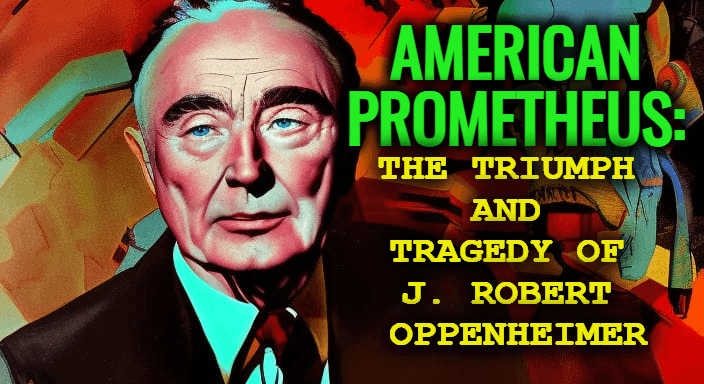What is the summary of the book American Prometheus: The Triumph and Tragedy of J. Robert Oppenheimer written by Kai Bird and Martin J. Sherwin? Information about the summary and analysis of this book.

“American Prometheus: The Triumph and Tragedy of J. Robert Oppenheimer” is a biography written by Kai Bird and Martin J. Sherwin. It explores the life and career of J. Robert Oppenheimer, an American physicist who played a significant role in the development of the atomic bomb during World War II.
The title “American Prometheus” draws a parallel between Oppenheimer and the Greek mythological figure Prometheus, who stole fire from the gods and brought it to humanity, symbolizing both progress and destruction. Similarly, Oppenheimer’s work on the atomic bomb led to the triumph of harnessing atomic energy but also brought about the tragedy of its devastating potential.
The biography delves into Oppenheimer’s early life, his education at Harvard and the University of Göttingen, and his contributions to theoretical physics. It extensively covers his leadership of the Manhattan Project, a secret U.S. government program that developed the atomic bomb. Oppenheimer’s complex personality, political beliefs, and conflicts with other scientists and government officials are explored, as well as the subsequent controversies surrounding his security clearance and his involvement in the post-war nuclear arms race.
“American Prometheus” provides a comprehensive examination of Oppenheimer’s personal and professional life, highlighting his successes and failures, and ultimately portrays him as a complex figure who embodied both the triumphs and tragedies of the atomic age.
Plot Summary
“American Prometheus: The Triumph and Tragedy of J. Robert Oppenheimer” presents a detailed and comprehensive account of the life of J. Robert Oppenheimer, from his early years to his role in the development of the atomic bomb and the subsequent controversies that surrounded him.
The biography begins by exploring Oppenheimer’s upbringing in a wealthy Jewish family in New York City and his early education. It then delves into his academic pursuits at Harvard and the University of Göttingen, where he developed a deep passion for theoretical physics. Oppenheimer’s intellect and scientific achievements earned him recognition and respect within the scientific community.
The narrative progresses to Oppenheimer’s pivotal role in the Manhattan Project during World War II. As the director of the Los Alamos Laboratory, he led a team of scientists and engineers working to develop the atomic bomb. The book provides an in-depth exploration of the scientific and ethical dilemmas faced by Oppenheimer and his colleagues as they grappled with the immense power and destructive potential of their creation.
However, Oppenheimer’s association with leftist political beliefs and his past involvement with communist organizations attracted the attention of government officials during the post-war Red Scare and anti-communist fervor. The biography delves into the subsequent investigation and security clearance hearing, during which Oppenheimer’s loyalty and trustworthiness were questioned. The book examines the controversies surrounding the hearing and the ultimate revocation of his security clearance.
“American Prometheus” also delves into Oppenheimer’s post-Manhattan Project life, including his role as an influential scientific advisor and his vocal opposition to the further development and use of nuclear weapons. The biography explores Oppenheimer’s personal struggles and his efforts to reconcile his moral concerns with his contributions to the atomic age.
Ultimately, the book portrays Oppenheimer as a complex and enigmatic figure, highlighting both his achievements as a brilliant physicist and his personal and professional struggles. It examines the triumphs of his scientific endeavors and the tragedy of the controversies and personal sacrifices he faced in the aftermath of the atomic bomb’s development.
Analysis
“American Prometheus: The Triumph and Tragedy of J. Robert Oppenheimer” provides a deep analysis of the life and character of J. Robert Oppenheimer, offering insights into his scientific achievements, political beliefs, and the complex moral and ethical dilemmas he faced.
One of the central themes explored in the biography is the dual nature of Oppenheimer’s legacy. The title “American Prometheus” suggests that Oppenheimer, like the mythological figure Prometheus, brought about both triumph and tragedy. His role in the Manhattan Project and the successful development of the atomic bomb marked a triumph in the realm of science and technology, representing a significant advancement in human knowledge and capabilities. However, the destructive power of the atomic bomb also brought about immense tragedy, raising moral questions and concerns about the potential consequences of this new weapon.
The book delves into Oppenheimer’s personality and his complex relationships with his colleagues and government officials. It portrays him as a brilliant and charismatic scientist who inspired and led his team at Los Alamos, but also as a complex and enigmatic figure with contradictory traits. Oppenheimer’s political beliefs and associations with leftist groups were scrutinized during the McCarthy era, leading to his investigation and the subsequent security clearance hearing. This aspect of the biography highlights the political climate of the time and the tension between scientific freedom and national security.
Another important aspect of the analysis is Oppenheimer’s personal struggles and inner conflicts. The biography explores his moral concerns and regrets regarding the development and use of nuclear weapons. Oppenheimer’s opposition to the further proliferation of nuclear arms after the war and his efforts to promote international cooperation for peaceful purposes are examined, shedding light on his evolving perspectives and attempts to reconcile his role in the atomic age.
Additionally, “American Prometheus” provides a broader historical context, discussing the global implications of the atomic bomb and the subsequent arms race. The book raises questions about the responsibility of scientists in the face of technological advancements with far-reaching consequences.
Overall, the analysis presented in the biography offers a nuanced and multidimensional understanding of J. Robert Oppenheimer, exploring his scientific achievements, political struggles, and moral dilemmas. It invites readers to grapple with the complexities of the atomic age and the ethical challenges posed by scientific advancements.